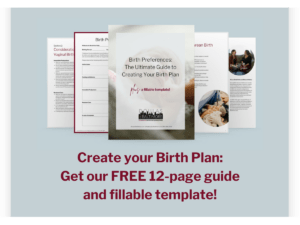Nearly every parent can recall a moment during those early weeks of their baby’s life, when their sweet, innocent little bundle of joy seemed more like a terrifying little monster. This scary time is often referred to as the “Witching Hour”, derived from folklore to mean the time of day when the ghosts, monsters, and demons were said to have appeared.
Like the term ‘morning sickness’ (which frequently happens far more often than just the morning), the phrase ‘witching hour’ is also a misnomer. Your newborn may spend well more than 60 minutes in this seemingly inconsolable state. Particularly during this time of year, when the sun sets earlier, it is not uncommon for the witching hour to include the hours leading up to and immediately following sunset.
So what then IS the witching hour?
The witching hour is a period of excessive fussiness, crying, irritability, and/or sleeplessness, sometimes spanning several hours, often occurring during the late afternoon into evening. It is extremely common for newborns, particularly in weeks 2-4 of their lives, to exhibit this behavior but can (unfortunately) extend for weeks.
What causes the witching hour in newborns?
Overstimulation
It’s the end of another long and grueling day; you’ve been bombarded by noises, lights, sounds, textures, smells, and other external stimuli for hours on end. It’s enough to make adults want to retreat to their happy place! Now, consider a newborn, only weeks into this journey that is life, experiencing all of these same stimuli. This is why the number one cause of the ‘witching hour’ can be attributed simply to overstimulation. As humans, when we are overwhelmed by external stimuli, it is difficult for our mind and body to rest – overstimulation leads to being overtired too.
Gastrointestinal Discomforts
Your baby’s GI system is also brand new, working hard to learn how to suck, swallow, and digest milk, absorb nutrients, and pass gas and stool. It can be expected that this immaturity can contribute to increased gas (and the ensuing fussiness and discomfort), particularly after a full day of feedings. It’s also not unusual for excess gas and discomfort to compound throughout the day.
Hunger
A baby’s nutritional needs change throughout the course of the day. It is not uncommon for babies to appear more hungry during the late afternoon and evening hours. This is partially a biological response for breastfed babies in that breastmilk production and supply tends to be at the lowest during this time of day. Babies who are bottle fed may exhibit hunger cues even after finishing their usual portion of milk.
Tricks & Treats: What can we do to help our baby through the witching hour?
Reduce stimulus
If you have taken DOB’s Baby 101 workshop, you have likely learned about Dr. Harvey Karp and his 5 S’s; Swaddle, Sway, Side-lying, Suck, and Shhh (or Sound). Combining these five activities can help to reduce external stimuli and, hopefully, encourage baby to close their eyes. A favorite trick for our postpartum doulas is taking baby, swaddled and with a pacifier, into the bathroom, turning off the lights and turning on the exhaust fan! And baby-wearing can be a treat for the whole family. Putting baby in an inward-facing wrap or carrier is a great tool to get through this time, too.
Encourage burps and toots
Encouraging baby to burp and pass gas frequently throughout the day can help alleviate fussiness and bloating in the evenings. Whether breast or bottle feeding, burping baby mid-feeding is always a good idea. Giving baby time to lay and move their limbs can also aid in teaching them how to release gas as well. Ultimately, time and maturity are the only true ‘fix’.
Feed frequently
While we can’t eliminate baby’s desire to feed frequently in the evenings, sometimes preemptively increasing afternoon feedings can help. This may mean waking more frequently for shorter durations between feedings (2-2.5 hours maximum would be our recommendation). Or increasing the amount or duration at the last feeding session prior to the anticipated witching hour time frame. Cluster feeding, especially in the evenings, is very normal for breastfed babies in anticipation of a growth spurt. Again, this is an instance where time may be the only solution.
Is there a way to eliminate the witching hour?
While it can be difficult to accommodate for every family, one of the benefits of this time of year is the earlier sunsets. If their witching hour is around 5 pm, ensuring they have a quality late afternoon nap may help. Take advantage of the darkness to push baby’s bedtime back a bit. If baby seems cranky, irritable or inconsolable by 7:30 pm every night, aiming to have them settled and to sleep by 7 pm could help (and mean you might get a few minutes of peace!).
While we can not guarantee that these tips and tricks will work every time with every baby, we can assure you that you are not alone, and ultimately, this time will pass.













